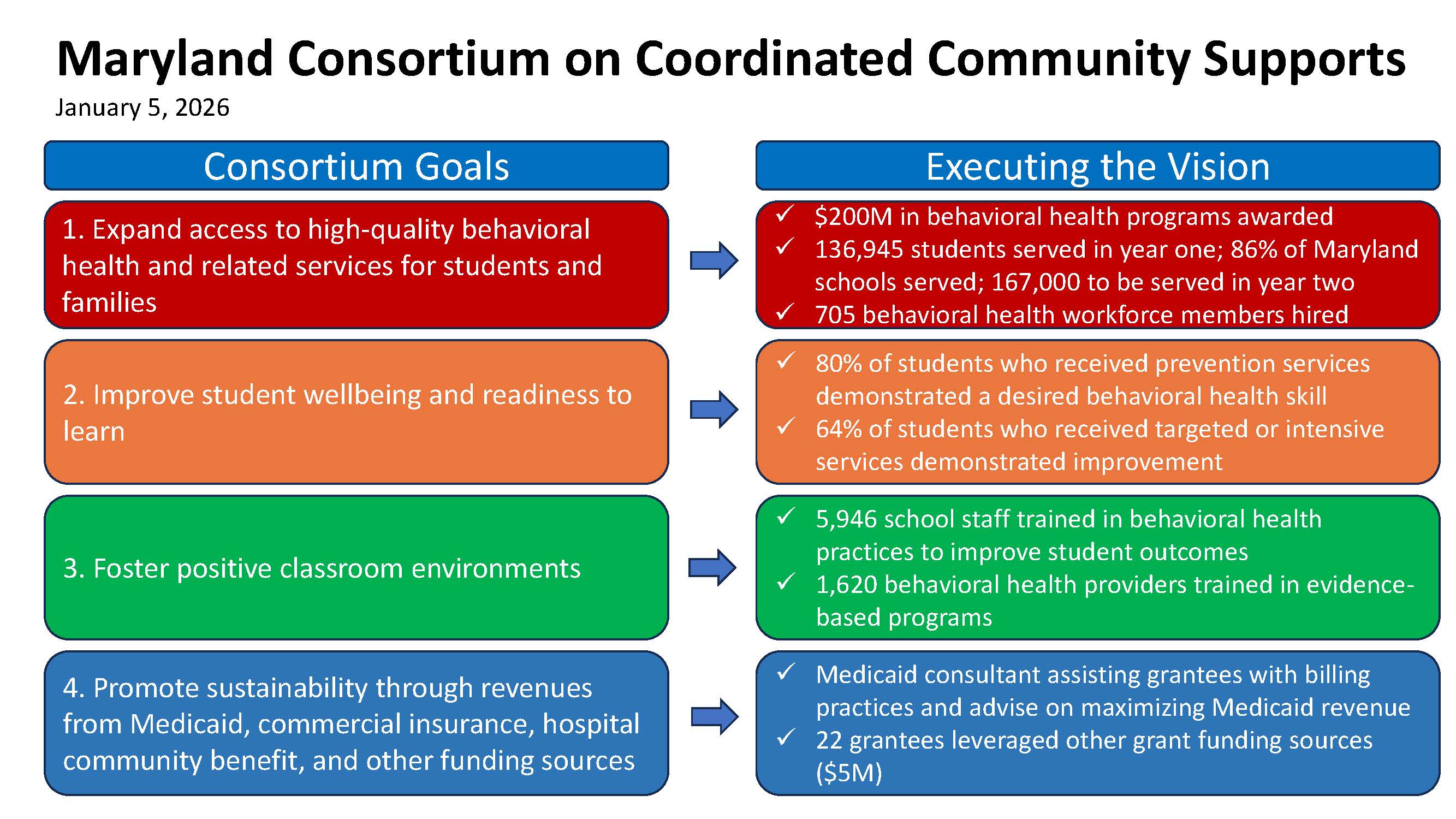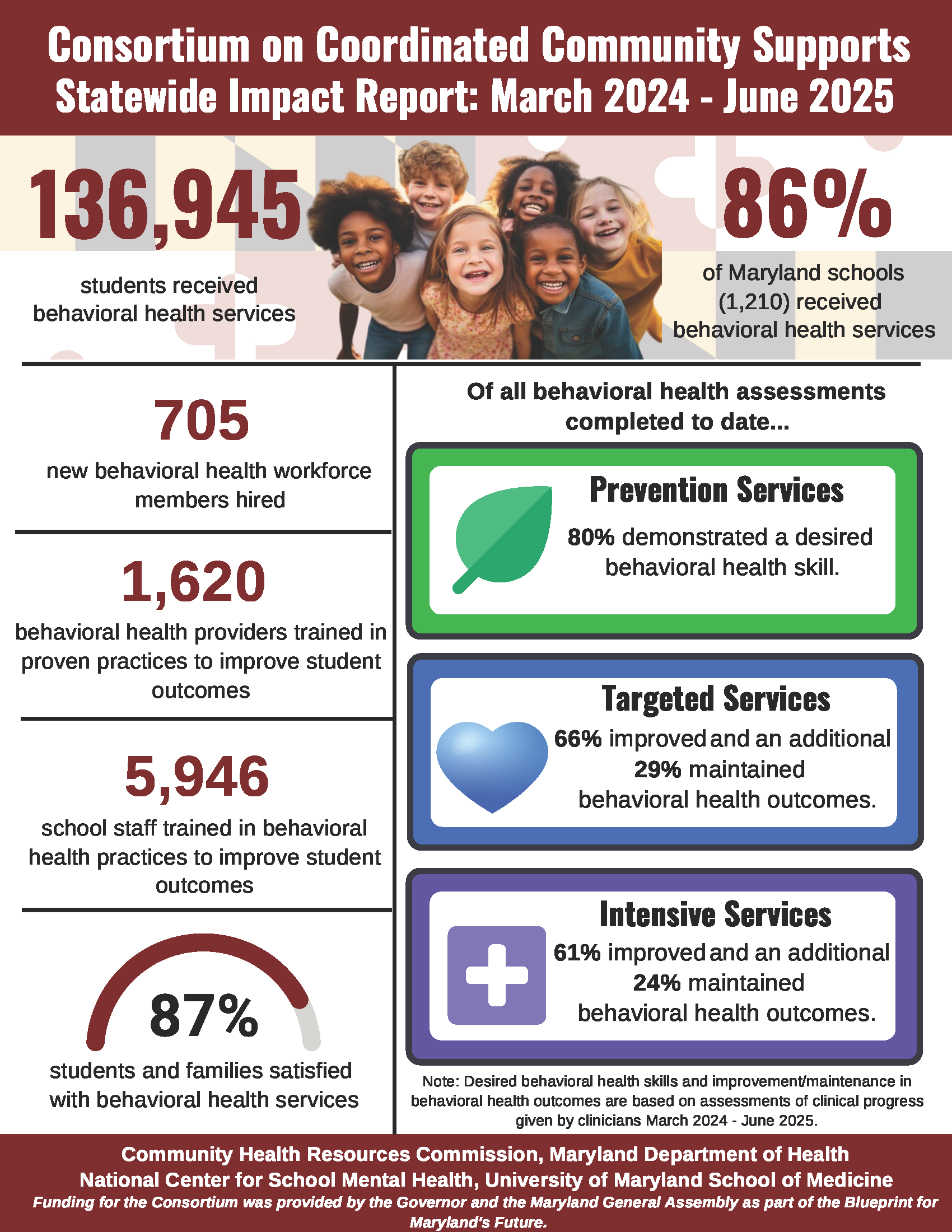Maryland Consortium on Coordinated Community Supports
Under the Consortium program, 108 programs totaling $96 million are under implementation across the state. Learn more about the awards here. The programs are projected to serve 167,000 students and support services in 80% of Maryland schools. During the current school year, more than 94,000 students have been served (download here).
Background
The Maryland General Assembly created the Maryland Consortium on Coordinated Community Supports as part of the Blueprint for Maryland's Future in recognition of the critical role that mental health and wraparound services will play in supporting student achievement. The Consortium is a 25-member entity responsible for developing a statewide framework to expand access to comprehensive behavior health services for Maryland students. The Maryland Community Health Resources Commission (CHRC) serves as the Consortium's fiscal agent and is responsible for providing staff support for the Consortium. The National Center for School Mental Health
is providing technical assistance. The Consortium began its activities during the summer of 2022. The General Assembly leadership appointed David D. Rudolph to serve as the Consortium's chair.
The Consortium is responsible for expanding access to comprehensive behavioral health services for Maryland students, pre-K through grade 12. As part of this mandate, the Consortium is funding new and expanded programming in all 24 jurisdictions; fostering collaboration between providers, schools, and families; and providing training and technical assistance in evidence-based approaches for clinicians and educators.
Consortium Statutory Scorecard: The Consortium has released its Statutory Scorecard which monitors progress toward the 12 statutory objectives established in the Blueprint for Maryland’s Future. This Scorecard demonstrates actions taken and outcomes achieved to advance the goals of the Consortium (download the Scorecard here).
Consortium Goals: The Consortium developed four overall goals to promote accountability in executing the program. The Consortium released the following update on progress toward these goals.

Consortium Impact Statement in Year 1: Consortium-funded programs served more than 136,000 students in 86% of Maryland's schools (2024-2025 school year). 80% of students demonstrated a new behavioral health skill and 87% and student and families report satisfation with the behavioral health services received.


Fostering Collaboration: The Blueprint requires the Consortium to form local “Community Supports Partnerships" across the state. Using the collective impact model, each Partnership consists of a local coordinating body called a “Hub," as well as the local community behavioral health providers. Hubs coordinate service providers in collaboration with schools. In the 2025-2026 school year, the Consortium has funded 7 full Community Supports Partnerships serving 12 jurisdictions.
Providing world-class training and technical assistance: The Consortium and National Center for School Mental Health are providing training and implementation support to grantees in
15 evidence-based programs. This training will improve outcomes for Maryland students receiving services. School staff will also receive training and implementation support
in evidence-based programs.
Membership: A list of Consortium members may be found at the following link.
Request for Applications: The FY 2027 Consortium RFA was released on December 10, 2025. Applications are due no later than 3pm EST on February 11, 2026. For more information about the RFA, visit the Consortium Request for Applications webpage.
Consortium Impact Statement: Downloadable a copy here of the Year 1 Impact Statement shown above.
Reports and Presentations may be downloaded at the following link.
Mailing List: Information to join the Consortium mailing list may be found by following this link.
County Information & Resources

